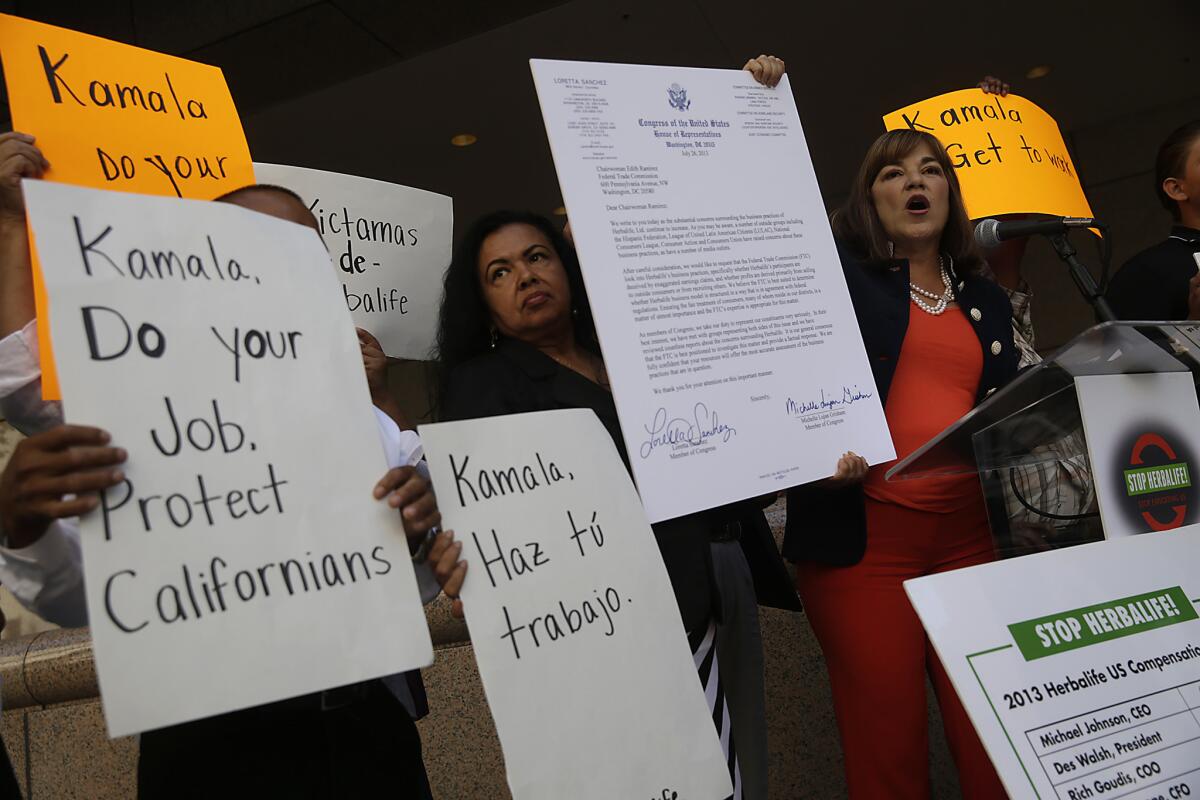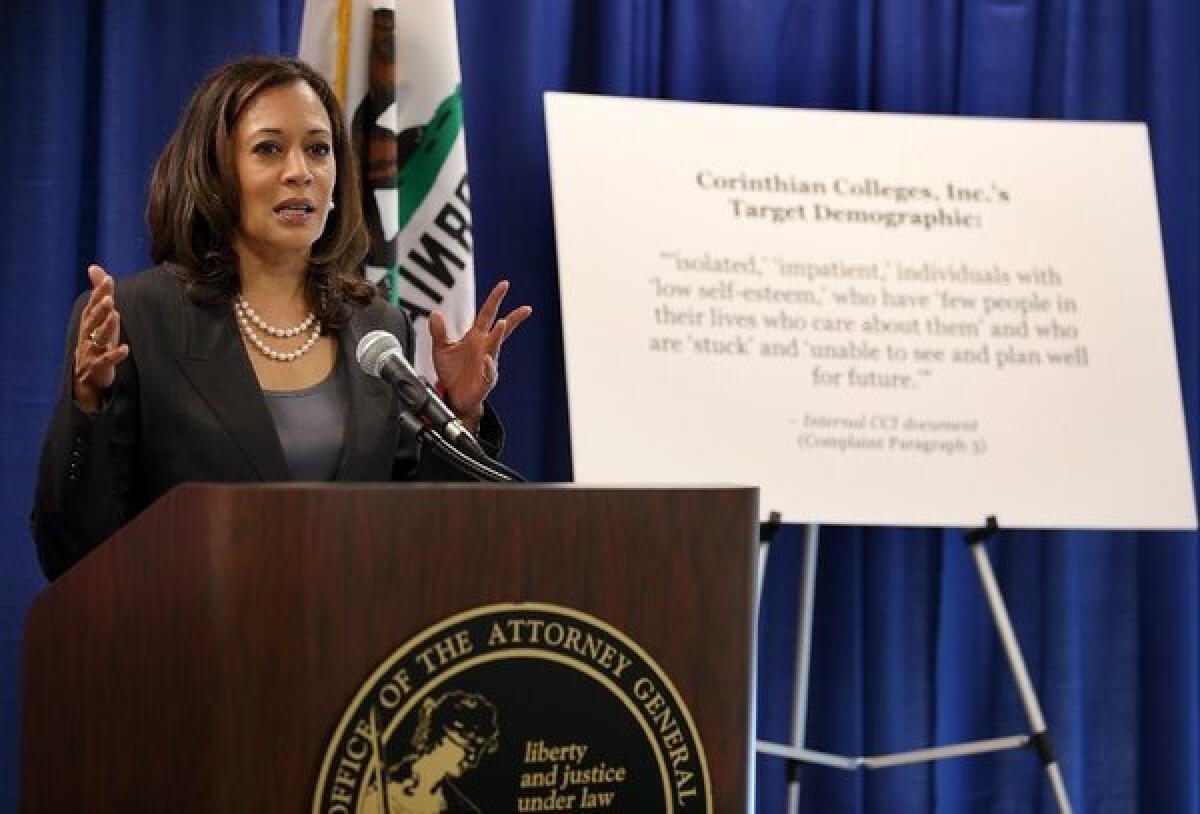Loretta Sanchez has gone negative. Now she’s risking fallout for a future in the Democratic Party.

Reporting from Sacramento — Behind in the polls and lagging in fundraising, Orange County Rep. Loretta Sanchez has shifted into attack mode in her effort to close the gap with the front-runner in California’s U.S. Senate race, state Atty. Gen. Kamala Harris.
In just the last two weeks, Sanchez has latched onto scandals surrounding Trump University, the closed San Onofre nuclear power plant and nutritional company Herbalife to question Harris’ effectiveness as California’s attorney general. By attacking a fellow Democrat, Sanchez could peel away some Harris supporters, but she might also alienate party loyalists — which could hamstring another run for higher office if she falls short in November.
“She has to take big risks to catch Kamala,” said former Democratic Assembly Speaker Fabian Nuñez, who has endorsed Harris.
The success or failure of those aggressive tactics in this Democrat-versus-Democrat race may influence high-stakes campaigns in California for years to come. The Harris-Sanchez contest is the highest-profile face-off between two members of the same political party since California adopted the top-two primary system in 2012. And in a state under solid Democratic rule, more brutal intra-party fights are all but certain to be on the horizon.
“I think this is all part of a new political paradigm,” Nuñez said. “This is the result of the open primary, and what it speaks to is the intramural differences and fights that happen usually during a primary battle.”
Unlike the barrage of caustic political ads that traditionally invade Californians’ TV screens, car radios and mailboxes in hotly contested statewide races, Sanchez’s effort thus far is being done on the cheap — by staging news conferences and ginning up media coverage.
That tactic is more about necessity than strategy. With a campaign bankroll of less than $1 million as of June 31, the Sanchez campaign has nowhere near the tens of millions of dollars it would need to pay for a sustained advertising campaign in a state as vast as California, home to some of the priciest media markets in the nation.
“It probably won’t get a lot of traction,” Berkeley-based Democratic political consultant Katie Merrill said of Sanchez’s efforts. “She would need $20 million behind these negative messages to move voters in any significant way. That’s just the nature of campaigns in California.”
Rep. Brad Sherman of Porter Ranch said criticizing an opponent has always been fair game in elections, but the rules are a bit different in a general election between two candidates from the same party. Candidates must draw contrasts with their opponent in a way that appeals to voters across the political spectrum — without aggravating those in their own party, he said.
“If you give them positive stuff about you, they may find it boring. If you give them negative stuff about your opponent, they may find it reprehensible,” Sherman said. “Every vote is up for grabs. Your appeals to Republicans have to be careful not to alienate Democrats.”
Sherman learned that firsthand during his successful 2012 matchup against former Rep. Howard Berman, California’s biggest Democrat-versus-Democrat showdown until now.
Just how effective Sanchez’s negative attacks have been is difficult to judge. Newly released opinion polls offer conflicting results.
A poll released Wednesday by Public Policy Institute of California showed Sanchez closing in on Harris, now trailing behind by just seven percentage points among likely voters. A Field poll released the same day showed Sanchez losing ground, trailing Harris by 22 percentage points.
Still, Sanchez’s attacks on Harris have reaped coverage in newspapers and television and radio news outlets up and down the state.

The biggest splash came shortly after Labor Day, when a New York Times story named Harris one of four state attorneys general who launched investigations into complaints against Trump University and also accepted campaign contributions from the school’s namesake, Republican presidential nominee Donald Trump. The story focused on claims that Trump donated $25,000 to an organization backing Florida Atty. Gen. Pam Bondi to influence her agency’s inquiry into fraud allegations against Trump University.
Sanchez accused Harris of failing to take legal action against the business because of her political ties to Trump, saying she should have initiated an investigation after a federal class-action lawsuit was filed in California against Trump University in 2010.
“These campaign contributions raise troubling questions about Kamala Harris’ inaction on Trump University,” Sanchez said.
Trump donated to Harris’ reelection campaign for state attorney general — $5,000 in 2011 and $1,000 in 2013. In the years before, Trump also donated to other California Democrats, including Gov. Jerry Brown and Lt. Gov. Gavin Newsom. Harris donated the contributions to charity in 2015 after Trump made inflammatory comments about Mexican immigrants.
Her campaign called Sanchez’s allegations baseless and ridiculous, saying Harris spearheaded the toughest investigation in the nation into the predatory practices of for-profit colleges. In March, Harris won a $1.1-billion judgment against Orange County-based Corinthian Colleges, one of the world’s largest for-profit college businesses, for false advertising, fraud and misleading students.

The Harris campaign used that case to return fire. Campaign manager Juan Rodriguez ripped Sanchez for accepting thousands in campaign contributions from Corinthian Colleges and, in Congress, opposing the Obama administration’s attempts to increase the regulation of for-profit colleges.
“While Kamala Harris’ investigation and suit against Corinthian led to the collapse of the predatory for-profit chain, Congresswoman Loretta Sanchez joined an army of lobbyists to protect Corinthian and other predatory for-profits in Congress,” Rodriguez said in a statement emailed to reporters.
The Harris campaign also used the opportunity to tout a new PBS Frontline documentary that examines the collapse of Corinthian and offers a flattering portrayal of Harris’ role in its demise.
Election 2016 | California politics news feed | Sign up for the newsletter

That has been the most pointed attack launched against Sanchez so far, though the Harris campaign in emails to potential donors has repeatedly criticized the congresswoman for being backed by “Trump-esque” Republicans such as talk radio host Hugh Hewitt and Rep. Darrell Issa (R-Vista).
At public campaign events, Harris rarely mentions Sanchez by name, but she has clearly telegraphed possible lines of attack against her rival that could come in the weeks ahead.
Harris issued a statement this month demanding that “Congress must protect and expand Social Security — not cut benefits for seniors.”
That was a veiled jab at Sanchez, who supported a deficit reduction plan co-written by former Republican Sen. Alan K. Simpson of Wyoming and Erskine Bowles, former chief of staff to President Clinton. It was never adopted, but among its many provisions was raising the retirement age and reducing future Social Security benefits for high-income earners, which opponents criticized as cuts to Social Security.
After the terrorist attack in San Bernardino that killed 14 people last December, Harris met with religious and community leaders in Southern California and issued a statement condemning anti-Muslim rhetoric that followed the tragedy.
Again, Sanchez’s name was never mentioned. But Harris’ comment came shortly after the congresswoman was criticized by Muslim groups for suggesting in a television interview that 5% to 20% of Muslims support a caliphate — a strict Islamic state.
Subtle or not, Harris has also relied heavily on news coverage to deliver her message. Her campaign also lacks the cash needed for a large-scale media campaign, though she has been more successful at raising money and had $2.6 million in the bank at the end of June.
UC San Diego political scientist Thad Kousser said going negative is complicated by the fact that California’s Senate race is between two Democrats.
“It’s really risky to say negative things about someone in your own party,” Kousser said. Harris is “in the lead and she has the most to lose from any backlash over going negative.”
Sanchez faces the same problem, but she has little choice, Kousser said. The congresswoman also is at a great disadvantage because she’s relying on the press to be her messenger. Negative attack ads and mailers would be much more effective because the campaign would have complete control over what voters see and hear.
“She has to rely on the media to do it for her. That means that media applies their filter, their judgment,” Kousser said. “Some stories they will report…. Some they won’t report.’’
Democratic political consultant Michael Trujillo said Sanchez’s biggest challenge will be to keep the television news cameras focused on her. That will be difficult when the voters are entranced by nonstop coverage of the presidential race and its daily bombshells.
“I’m hard-pressed to say how many times I’ve seen Kamala Harris or Loretta Sanchez on the evening news,” said Trujillo, who plans to vote for Harris. “It’s just not getting coverage.”
Last week, Sanchez did attract cameras when she held a news conference in front of the L.A. branch of the state attorney general’s office. She accused Harris of not doing enough to protect consumers from what she called the “predatory practices” of nutritional company Herbalife.
Sanchez said Latino immigrants were specifically targeted by the company, and repeated her criticism of Harris in Spanish for L.A.’s Spanish-language television news crews.
“Ha hecho nada,” or “she’s done nothing,” Sanchez said.
Afterward, when asked whether she needed to attack Harris to win in November, Sanchez said she doesn’t consider her criticisms to be negative campaigning.
“I am just bringing out the truth,” Sanchez said before walking away to do a TV interview.
Twitter: @philwillon
Times staff writer Javier Panzar contributed to this report.
ALSO:
Rep. Loretta Sanchez attacks state Atty. Gen. Kamala Harris over controversial company Herbalife
Along with Kamala Harris, Loretta Sanchez is struggling to beat ‘none of the above’
Meet the men plotting strategy for California’s U.S. Senate candidates
Kamala Harris wants college to be free — for families earning less than $140,000 a year
Updates on California politics
More to Read
Get the L.A. Times Politics newsletter
Deeply reported insights into legislation, politics and policy from Sacramento, Washington and beyond. In your inbox three times per week.
You may occasionally receive promotional content from the Los Angeles Times.











